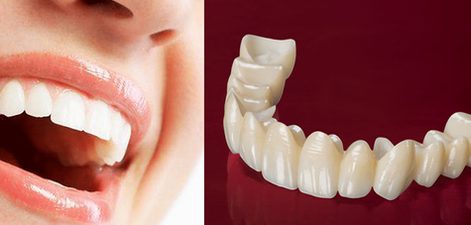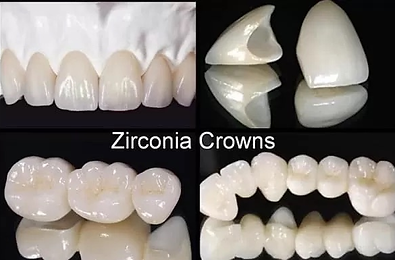
Zircon caps
Zirconium crowns are one of the most commonly used aesthetic dental crowns in dentistry. Zirconium material provides high quality both aesthetically and functionally by matching the natural color of teeth. These crowns are also known for being strong and durable, providing long-term protection for teeth.
What are zirconia caps?
Zirconium crowns are dental crowns made from a highly durable and biocompatible material called zirconium dioxide. These crowns are placed over damaged, weakened, or aesthetically unsatisfactory teeth to help restore both function and appearance. Zirconium crowns have become one of the most popular dental crowns in recent years because they are durable, compatible with the gums, and aesthetically appealing.

In what cases are zirconium caps used?
Zirconium caps are mainly used to restore decayed, broken, weakened or aesthetically unpleasing teeth. They are also used as caps on implants, as abutments in bridgework, and to correct the shape and color of the tooth. They are distinguished by their strength and aesthetic appearance, so they have a wide range of uses in both front and back teeth.
Advantages of zirconia caps
-
High Strength and Durability – Zirconia is highly resistant to chewing forces and long-term use due to its hardness.
-
Natural Tooth-Like Appearance – Aesthetically, it provides a porcelain-like effect and is especially successful in the front teeth area.
-
Compatible with Gum Tissue – Being a biocompatible material, it does not cause irritation or allergic reactions in the gums.
-
No Risk of Darkening – Since it contains no metal, there is no risk of discoloration, particularly near the gum line.
-
Long-Lasting – With proper care, it can be used for more than 10 years.

Disadvantages of zirconia caps
-
The price is higher than other caps – It is expensive in terms of protection and technology.
-
In some cases, the color match may not be as natural as porcelain – this can be observed especially in zirconia models with low translucency.
-
The preparation stage is technically more precise – The tooth preparation and laboratory stage require high precision.
-
There may be limitations for very aesthetic teeth in terms of translucency – If you want complete natural translucency, porcelain may be more suitable in some cases.




Questions and answers about zirconia caps
1. What does the price of zirconia teeth depend on? The price of zirconia teeth depends on several factors: the quality of the zirconia material used, the dental lab technology, the experience of the dentist, and the condition of the tooth being restored. Additionally, the number of teeth and the patient's aesthetic expectations also influence the overall cost.
3.Do zirconia teeth become discolored over time? No, zirconia teeth do not become discolored. Zirconia is known for its color stability and light-transmitting properties. It has high resistance to staining and discoloration, and with proper care, it can maintain its bright and aesthetic appearance for many years.
2. When are zirconia crowns used? Zirconia crowns are typically used in the following cases: 🔹 For the aesthetic restoration of front teeth 🔹 When the tooth is severely damaged and cannot be restored with fillings 🔹 On top of dental implants 🔹 For patients with metal allergies 🔹 When a more natural and long-lasting result is desired
Are zirconia crowns stronger than metal-ceramic crowns? Both materials are strong in their own way, but zirconia crowns are considered superior in terms of aesthetics, biocompatibility, and mechanical strength. Metal-ceramic crowns are often offered as a more budget-friendly alternative, but zirconia is a more modern and long-lasting option.


